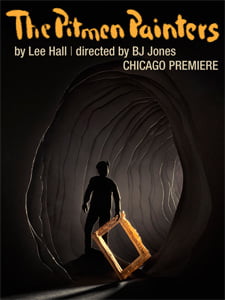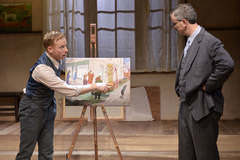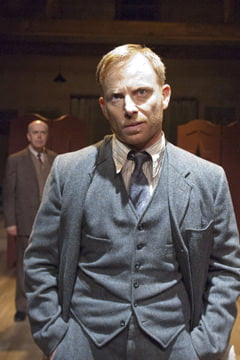The Pitman Painters
Inspired by a book by William Feaver
Directed by BJ Jones
At TimeLine Theatre
Hilarious yet poignant drama about artistic meaning an expression emerges as wonderful theatre.
“Art makes something possible that wasn’t there before.”
When told that there is no secret to art, Harry says: “If there’s not a secret—how come we don’t knaa what’s gannin’ on?”
TimeLine Theatre scores another terrific Chicago premiere with Lee Hall’s (Billy Elliott) The Pitmen Painters. Based on a book William Feaver that chronicled the real miners attempt to learn about art.
When a group of Northern England coal miners decide to try to better themselves by taking an art appreciation class, their instructor, Robert Lyon (Andrew Carter) has a class and cultural gap that seems insurmountable. His references to Italian Renaissance delivered more humor than understanding from the mostly uneducated miners. Lyon then decided that the best way for for the miners to understand art was to paint- to create art- so that they could appreciate the deeply personal feelings that the creative process involves.
It is 1934 and the miners still work hard and make little yet through their union’s Workers’ Educational Association (WEA), they have a unique opportunity to grow in self-expression that would raise them above their humble working class origins.
They come to be known as the Ashington Group of pitmen painters. The eccentric group consists of George Brown (the officious William Dick), Oliver Kilbourn (Dan Weller in a emotionally strong fine turn), Harry Wilson (James Houton), Jimmy Floyd (the hilarious Steven Pringle) and the Young Lad who observes (Jordan Brown). These miners quickly embrace Robert Lyon’s lessons by putting their working class raw personal instincts on their canvasses. Using Mike Tutaj’s video projections that illustrate actual works by the Pitmen Painters, we see each of their art works and we appreciate the critiques by Lyon and each other. Hall’s script is indeed an in depth theses on the nature of art and the power of individual expression. We come to realize that the meaning of an art piece lies in the eye of the observer and that ultimately there are no rules to art, that technique is easily over shaded by personal expression.
The journey of the Ashington Group from 1935 through 1947 is one of personal growth both as artists and individuals through a group mentality. We see how Oliver Kilbourn, the most dedicated painter of the group, flirts with an offer form the rich collector, Helen Sutherland (Loretta Rezos) to leave the mines and paint full-time. She offers to pay him more than his meager miner’s wage. But when Oliver meets famed painter Ben Nicholson (Jordan Brown), he learns that Nicholson envies Oliver because he and his group are free of paint what they want since they don’t depend on art sales to make a living. Oliver tells Helen: “I was my own boss!” (when he paint and he wants to stay that way).
Helen and Lyon arrange several exhibitions of Pitmen Painter art as well as trips to museums in London and Edinburgh. But World War II and time slowly dissipates the group. We see how cocky and almost elitist there miners become. Hall never talks about those who were less than inspired or had little artistic talent and we never experience how the other miners react to the groups fame. The ending depicts a movement in England away from any collective togetherness by labor groups making the Ashington Group a relic of the past. The play is a triumph of the human spirit that looks at art as an intrinsic part of the human condition. This story pays homage to that urge. BJ Jones and his cast gave truthful performances that make the discussion of art fun.
Highly Recommended
Tom Wiliams
Talk Theatre in Chicago podcast
Date Reviewed: September 10, 2011
At TimeLine Theatre, 615 W. Wellington, Chicago, IL, www.timelinetheatre.com, tickets $32 & $42, Wednesdays & Thursdays at 7:30 pm, Fridays at 8 pm, Saturdays at 4 & 8 pm , Sundays at 2 pm, running time is 2 hours, 15 minutes with intermission, through December 18, 2011





